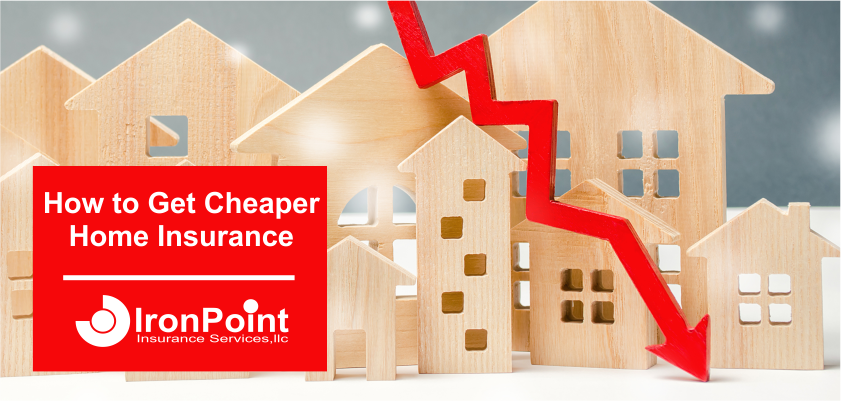Cheapest Home Insurance: Are You Sure That’s What You Really Want?

So, you just Googled “cheapest home insurance.” I get it. Your mortgage payment is already sky-high, property taxes keep climbing, and now your home insurance premium is up for renewal at a rate that made you do a double-take. Finding the cheapest option seems like a no-brainer.
But let me ask you something: When it comes to protecting the most expensive thing you’ll ever own, is “cheapest” really the adjective you want?
Look, we’re not here to upsell you or convince you to buy home insurance coverage you don’t need. I’m here to have the conversation your typical insurance agent might dance around: the uncomfortable truth about bargain-basement home insurance policies and what they could really cost you.
Let’s talk about what “cheap” actually means when it comes to protecting your home—and why you might want to reframe your search.
When the Cheapest Home Insurance Isn’t So Cheap After All
Imagine this scenario: You save $300 a year by switching to a bare-bones policy. That’s an extra $25 in your pocket each month—enough for a few coffees or a budget dinner out.
Feels good, right?
Fast forward six months. You notice moisture near your dishwasher while cleaning the kitchen. Curious, you pull it out to investigate—and your stomach sinks. The hardwood floors are warped, the drywall is soaked, and worse, there’s visible mold spreading behind the cabinets.
You file a claim, confident this is exactly what insurance is for. A few days later, the adjuster calls:
“I’m sorry, but this type of loss isn’t covered. Based on our inspection, the leak likely began over a year ago. Your policy requires you to report a loss within 90 days of when it occurred—or when you reasonably should have known about it.”
That moment of moisture turns into thousands in remediation and repair. All because you didn’t have the right policy — or didn’t understand its limits.
This isn’t a scare tactic—it’s the reality many homeowners face when they prioritize premium over protection. Shopping for the cheapest home insurance is like buying a parachute based solely on weight—you might not realize what’s missing until you’re already falling.
What the Cheapest Policies Tend to Leave Out
When insurers slash prices, they’re not eating the cost difference out of generosity—they’re removing coverage. Here’s what those bargain policies often exclude:
No Replacement Cost? No Thanks.
Cheaper policies often use Actual Cash Value (ACV) instead of Replacement Cost. This means if your five-year-old couch gets destroyed, you’ll get what a used five-year-old couch is worth (maybe $300), not what it costs to buy a new one ($1,200). That gap comes straight from your wallet.
Dwelling Coverage That Won’t Cover Your Dwelling
Many budget policies underinsure your home’s structure, basing Dwelling Coverage on incorrect estimates of your interior upgrades rather than a detailed replacement cost estimate. If a fire destroys your home, you could be short tens of thousands for reconstruction — especially with today’s inflated building costs.
Liability Limits That Leave You Exposed
That $100,000 personal liability limit might have shaved $50 off your premium, but if someone slips on your property and sues for medical bills and lost wages, you could be personally responsible for anything beyond that limit. The difference between a $100,000 and $500,000 liability limit often costs less than a Netflix subscription.
No Coverage for Water Damage
Water backup, sudden plumbing leaks, and seepage are typically excluded from the cheapest policies. Yet water damage consistently ranks as one of the most common homeowners insurance claims.
Zero Additional Living Expense Coverage
If your home becomes uninhabitable, where will you stay? Without ALE coverage, your temporary housing costs come from your savings, not your insurance.
The Psychology of Budget Buying (We Get It)
Let’s be real: Money is tight for a lot of people right now. Inflation has driven up the cost of everything from groceries to gas, and the cost of home insurance is no exception. If you’re searching for “cheapest home insurance,” there’s a good chance you’re feeling the financial squeeze.
I respect that. Looking to save money on home insurance where you can is smart financial management.
But here’s the question worth asking: Is gambling on your home’s protection the right place to economize? Your home isn’t just where you live—it’s likely your largest asset and the foundation of your financial security.
When we cut corners on protecting our most valuable assets to save a few dollars monthly, we’re often making an emotional decision rather than a rational one. The immediate relief of a lower premium feels good today, but it creates vulnerability tomorrow.
Redefining What “Affordable” Should Mean
Let’s shift our thinking. Instead of chasing “cheap,” let’s pursue something better: value.
Affordable home insurance isn’t about finding the lowest possible price—it’s about getting the right coverage at the right price. It’s about maximizing your protection per dollar spent, not minimizing the dollars themselves.
What does real value look like in home insurance terms?
- Coverage that actually protects you from financial catastrophe
- A reasonable deductible you could pay without draining your emergency fund
- Protection against the most common and costly claims in your area
- Customer service that won’t leave you hanging when disaster strikes
- A clear, straightforward claims process that pays what you’re owed
The cheapest policy might save you $200-400 per year compared to a value-oriented option. But that value-oriented policy might save you tens of thousands if disaster strikes.
You don’t need to be Einstein to know that insurance math makes sense.
How to Tell If a Policy Offers True Value
Not all policies are created equal, and price alone tells you very little. Here’s your checklist for identifying true insurance value:
Adequate Dwelling Coverage
Your home should be insured for its full rebuilding cost, not its market value or purchase price. A good agent will help calculate this number based on local construction costs per square foot, your home’s features, and current building material prices.
Replacement Cost on Contents
This ensures you can replace your belongings with new items, not just receive their depreciated value. The premium difference is often minor compared to the benefit.
Reasonable Deductible-to-Premium Balance
A $2,000 deductible instead of a $1,000 one might save you $150 annually. That means you’d need to go 6+ years without a claim to break even. Is that the right gamble for your situation?
Essential Endorsements for Your Situation
Water backup coverage, extended replacement cost, scheduled personal property for valuables—these add-ons often cost little but provide significant protection against common losses.
Reputable Carrier with Strong Financial Rating
Look for companies rated A or better by AM Best. This indicates they have the financial strength to pay claims even after widespread disasters.
Clear Explanation of Coverage
A good agent or company will clearly explain what is and isn’t covered—without making you decode insurance jargon or fine print.
Watch Out for These “Too Cheap” Red Flags
Not all insurance bargains are created equal. Some are legitimate savings; others are disasters waiting to happen. Be wary of these warning signs:
Unknown or Poorly-Rated Insurers
If you’ve never heard of the company and they’re offering rates 40% below everyone else, proceed with extreme caution. Check their AM Best rating and Better Business Bureau profile before signing anything.
Drastically Lower Premiums Without Explanation
If one quote is significantly lower than others and the agent can’t clearly explain why (other than “we’re just cheaper”), they’re probably not comparing apples to apples.
No Local Presence or Claims Support
Some ultra-discount insurers save money by eliminating local adjusters and agents. When disaster strikes, you’ll be dealing with a call center, not someone who can come see the damage firsthand.
Excessive Exclusions in the Fine Print
Take the time to understand what isn’t covered. Some policies list so many exclusions that you’re essentially self-insuring for all but the most catastrophic events.
No Bundling Options
Quality insurers typically offer multiple lines of insurance and discounts for bundling home and auto. If they only sell bare-bones home policies, that’s often a red flag.
Want to Be Budget-Conscious and Protected? Here’s How.
You can be financially responsible without sacrificing essential protection. Here’s the smart approach to finding affordable home insurance that actually protects you:
Work with an Independent Agent
Independent agents (like us at IronPoint) can compare options from multiple carriers, helping you spot true value versus false economy.
Consider a Higher Deductible—But Not Too High
Raising your deductible from $500 to $1,000 often provides significant savings without excessive risk. Just make sure you keep that deductible amount in your emergency fund.
Bundle Your Policies
Combining home and auto insurance typically saves 10-15% on both policies — often a bigger saving than choosing the cheapest standalone policy.
Ask About Lesser-Known Discounts
Some insurers offer home insurance discounts for security systems, being claim-free, paying annually instead of monthly, or even having a newer roof. These can add up to significant savings without reducing coverage.
Review Annually, But Don’t Switch Constantly
Annual home insurance reviews make sense, but some carriers offer loyalty discounts that kick in after a few years. Constantly chasing the rock-bottom price might cost you these benefits.
Get The FREE Home Insurance Review Checklist
Quickly identify coverage gaps and strengthen your insurance protection with our easy and FREE Home Insurance Review Checklist.
Choose Confidence, Not Just Cost
At the end of the day, insurance isn’t just about having a policy—it’s about having confidence that when disaster strikes, you won’t face financial devastation on top of the emotional toll.
The cheapest home insurance might save you a few hundred dollars this year. But a value-focused policy will let you sleep soundly knowing that if the worst happens, you won’t be facing a financial nightmare.
That peace of mind is worth something. In fact, it’s worth exactly what a quality insurance policy costs.
Want help finding real value for your home insurance dollar—not just the lowest price tag? Let’s talk. At IronPoint Insurance Services, we’ll help you compare options that make sense for both your budget and your home’s protection needs.
Let’s Get Started
Select the way you want to start your quote.
Let’s Get In Touch
Compare Quote Online
Let’s Get Started

Want to know if you can save on home or auto insurance? See for yourself. Start a quote today.
Call today and speak with a professional insurance agent.
1-877-334-7646






